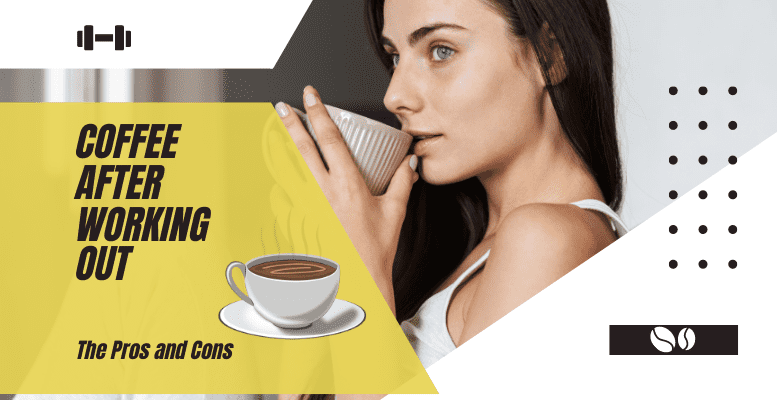It’s no secret that coffee is packed with antioxidants and nutrients that can positively impact your health. But you may not know that coffee can also be beneficial after a workout. Many people drink caffeine post-workout to improve their recovery. However, you should be aware of some potential downsides to drinking coffee after working out before making it part of your routine.
Let’s take a closer look at the pros and cons of consuming coffee after a workout to decide if it’s right for you.
THE PROS OF DRINKING COFFEE AFTER A WORKOUT
1. Improved Recovery
Consumption of coffee after a workout can help improve your recovery by reducing Exercise-Induced Muscle Soreness (EIMS). EIMS is caused by microscopic tears in your muscle tissue that occur during exercise. These tears lead to inflammation, which causes soreness after a challenging workout. The antioxidants in coffee can help reduce this inflammation and improve your recovery time.
2. Enhanced Fat Loss
Coffee after a workout can also help you lose fat more effectively. One study showed that men who drank coffee post-exercise had a higher rate of fat oxidation than those who didn’t drink coffee post-workout. This means that caffeine may help you burn more fat and get leaner faster.
3. Increased Energy Levels
It’s no surprise that drinking coffee will give you a boost of energy. Caffeine is a well-known stimulant that can help increase your energy levels and improve your focus. This can be helpful both during and after your workout.

THE CONS OF DRINKING COFFEE AFTER A WORKOUT
1. Dehydration
One potential downside of drinking it after a workout is that it can contribute to dehydration. This is because caffeine is a diuretic, which increases urine output and can lead to dehydration if you’re not careful to stay adequately hydrated throughout the day.
For example, I used to go to the gym and almost passed out after heavy lifting. I soon realized it was because I was drinking some cappuccino before working out, and all the water had left my system. If you decide to incorporate coffee into your post-workout routine, drink plenty of water throughout the day to offset its dehydrating effects.
2. Insomnia
Another potential downside of drinking coffee is that it can interfere with sleep if consumed too close to bedtime. This stimulant has a half-life of around five hours, which means it takes five hours for your body to eliminate about half of the caffeine from your system. So, if you drink coffee late in the afternoon or evening, there’s a good chance it will still be in your system when you’re trying to sleep.
This can lead to insomnia or poor sleep quality overall. To avoid this, try to avoid consuming caffeine within six hours of your desired bedtime. I also wrote an article on how to get better deep sleep. You can check it out.
HOW MUCH CAFFEINE SHOULD YOU DRINK POST-EXERCISE?
I will tell you I drink 1 to 2 cups of coffee daily but usually for a pre-workout boost. I usually don’t after a workout because I’m primarily at the gym late.
The amount of caffeine in a cup of coffee can vary depending on the type of bean, the roast, the grind, the brewing method, and even the water quality. Generally, however, a typical cup of coffee contains about 95 milligrams. To give you an idea, a can of cola typically contains about 35 milligrams of caffeine, while an energy drink can have up to 160 milligrams.
The body absorbs caffeine within 45 minutes of consumption, and its effects can last several hours. High levels of it can cause increased heart rate, restlessness, and insomnia. However, moderate caffeine consumption (1-2 cups per day) is generally safe for most people.
As I mentioned, caffeine can cause side effects like dehydration, jitters, and anxiety. For this reason, it is crucial to be aware of how much caffeine you consume when working out. The general rule of thumb is to limit caffeine intake to 200 mg daily.
This may vary depending on individual caffeine tolerance. If you are new to caffeine, start with a lower dose and gradually increase it as needed. Also, stay hydrated by drinking plenty of water throughout the day and avoid caffeine later in the evening to prevent difficulty sleeping.

BEST RECOMMENDATIONS FOR QUALITY IF YOU WANT TO DRINK COFFEE POST WORKOUT
A dark roast is likely your best option if you enjoy a strong cup of coffee. However, a light roast or flavored coffee may be more to your liking if you prefer something more lightweight.
You may wonder how to choose the best dark and light roast beans.
There are two main types of coffee beans: Arabica and Robusta. Arabica coffee beans are grown in higher altitudes and have a sweeter, more complex flavor than Robusta coffee beans. They are also more expensive. Robusta coffee beans are grown in lower altitudes and have a stronger, more bitter taste. They are less costly than Arabica coffee beans and are used in many instant coffee products.
The best coffee type is typically considered Arabica coffee beans since they contain 0.8–1.4% caffeine compared to 1.7–4% in Robusta coffee beans.
I used to think darker had more caffeine than light. The truth is that dark roast tends to lose caffeine in roasting. This means the lighter roast technically has more caffeine may.
Brazil is the largest coffee-producing country in the world, and its coffee is known for being well-balanced and rich. Colombian coffee is also very popular and is often described as smooth and chocolatey. Countries that produce great coffee include Ethiopia, Kenya, and Papua New Guinea. However, there is yet to be a definitive answer regarding the best coffee-producing country.
I usually look for an Arabica bean from either Colombia or Brazil.
WHAT ABOUT CAFFEINE IN A PRE-WORKOUT SUPPLEMENT
Yes, you will most likely always see this in your pre-workout to help increase performance. Your pre-workout caffeine amount can range from 150mg to 300mg.
I am pointing this out because some of you may not realize how much caffeine you have daily between the coffee and pre-workout supplement.
Do you still need to decide about having a cup of coffee after a workout? Then it would be best if you read an article I wrote about the best supplement post-workout. This supplement is excellent for restoring muscle glycogen. Glycogen levels decrease during a workout.
CONCLUSION ON CAFFEINE AFTER A WORKOUT
So, should you drink coffee after working out? While there are some potential downsides to consider, the pros outweigh the cons for most people. If you decide to drink coffee after exercising, stay hydrated throughout the day and limit your intake in the evening so that it doesn’t interfere with your sleep.
Drinking coffee after you exercise may help improve your performance, especially if you don’t typically drink caffeine regularly. However, if you’re someone who already drinks coffee every day, chances are you will see little difference in your workout compared to days when you don’t have any caffeine.
This post may contain affiliate links which means I may receive a commission for purchases made through links. I will only recommend products that I have personally used! Learn more on my Privacy Policy Page.
